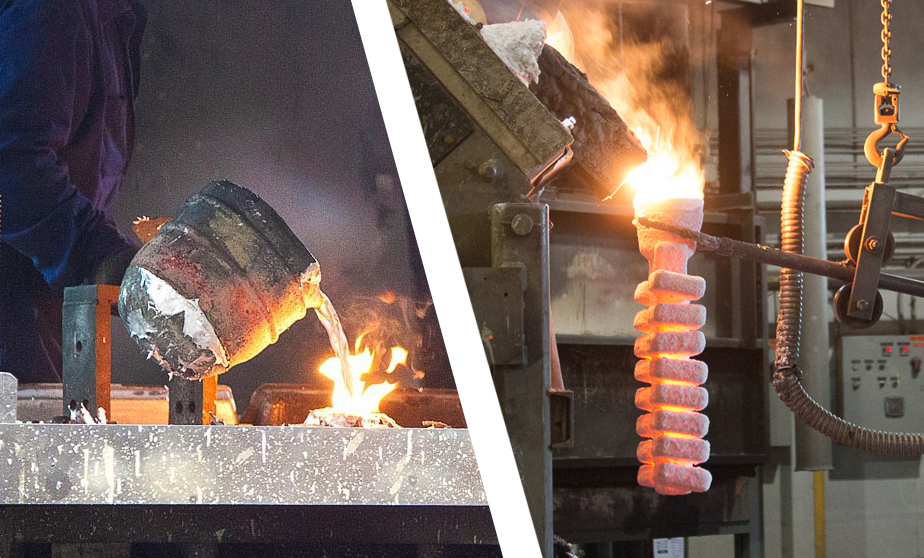The 15-Second Trick For Stahl Specialty Company
The 15-Second Trick For Stahl Specialty Company
Blog Article
The 2-Minute Rule for Stahl Specialty Company
Table of ContentsThe Ultimate Guide To Stahl Specialty CompanyGetting My Stahl Specialty Company To WorkOur Stahl Specialty Company IdeasThe Ultimate Guide To Stahl Specialty CompanyThe Basic Principles Of Stahl Specialty Company
The refined distinction exists in the chemical material. Chemical Comparison of Cast Aluminum Alloys Silicon advertises castability by decreasing the alloy's melting temperature level and improving fluidness during spreading. It plays a critical duty in enabling detailed mold and mildews to be filled precisely. In addition, silicon contributes to the alloy's stamina and wear resistance, making it important in applications where sturdiness is vital, such as automobile parts and engine components.It likewise enhances the machinability of the alloy, making it easier to refine right into ended up products. In this means, iron adds to the total workability of light weight aluminum alloys.
Manganese contributes to the stamina of light weight aluminum alloys and boosts workability. It is commonly made use of in wrought light weight aluminum products like sheets, extrusions, and accounts. The existence of manganese help in the alloy's formability and resistance to cracking throughout fabrication procedures. Magnesium is a light-weight component that gives strength and effect resistance to aluminum alloys.
It permits the production of lightweight components with exceptional mechanical buildings. Zinc boosts the castability of aluminum alloys and assists control the solidification process during casting. It improves the alloy's stamina and solidity. It is commonly located in applications where complex shapes and great information are required, such as ornamental spreadings and certain automotive parts.
Facts About Stahl Specialty Company Uncovered
Because aluminum-silicon alloys have good casting properties, high gas residential properties, straightforward processes, and superb rust resistance, aluminum-silicon alloys are most commonly made use of in the die-casting market at home and abroad. At the exact same time, aluminum-silicon alloys are also relatively early and extensively acknowledged alloys developed and made use of in die-casting. After constant study and improvement, many of the existing global mainstream aluminum-silicon alloys have been completed and are nothing greater than A356, A360, A380, ADC12, B390, and A413.
The main thermal conductivity, tensile stamina, return toughness, and prolongation vary. Select suitable basic materials according to the performance of the target item generated. Amongst the above alloys, A356 has the highest thermal conductivity, and A380 and ADC12 have the least expensive. The tensile limitation is the opposite. A360 has the very best return toughness and the greatest elongation price.

Stahl Specialty Company - Truths
In precision spreading, 6063 is fit for applications where intricate geometries and high-grade surface coatings are extremely important. Instances include telecommunication rooms, where the alloy's remarkable formability permits streamlined and cosmetically pleasing layouts while keeping structural honesty. Similarly, in the Lights Solutions market, precision-cast 6063 components develop stylish and reliable lights components that require complex forms and great thermal performance.
(https://triberr.com/stahlspecialc)
It brings about a finer surface coating and much better deterioration resistance in A360. Additionally, the A360 shows exceptional elongation, making it optimal for complicated and thin-walled elements. In precision casting applications, A360 is appropriate for industries such as Consumer Electronics, Telecommunication, and Power Devices. aluminum metal casting. Its boosted fluidity enables for complex, high-precision components like smartphone coverings and interaction gadget housings.

In accuracy casting, aluminum 413 shines in the Consumer Electronic Devices and Power Tools sectors. This alloy's exceptional corrosion resistance makes it an outstanding option for outdoor applications, making sure durable, sturdy items in the pointed out sectors.
7 Simple Techniques For Stahl Specialty Company
The light weight aluminum alloy you pick will substantially affect both the spreading procedure and the buildings of the last item. Since of this, you need to make your decision carefully and take an educated approach.
Identifying one of the most suitable aluminum alloy for your application will certainly suggest weighing a wide range of qualities. These comparative alloy qualities comply with the North American Die Spreading Organization's standards, and we have actually divided them sites into 2 categories. Aluminum Casting. The very first classification addresses alloy attributes that impact the production procedure. The second covers characteristics impacting the properties of the last item.
The alloy you pick for die spreading straight affects numerous aspects of the spreading process, like exactly how simple the alloy is to collaborate with and if it is vulnerable to casting defects. Warm breaking, additionally known as solidification fracturing, is a common die casting problem for light weight aluminum alloys that can cause internal or surface-level rips or cracks.
The 8-Minute Rule for Stahl Specialty Company
Particular light weight aluminum alloys are much more prone to warm splitting than others, and your selection needs to consider this. An additional common issue located in the die casting of light weight aluminum is die soldering, which is when the cast adheres to the die walls and makes ejection challenging. It can damage both the cast and the die, so you should seek alloys with high anti-soldering homes.
Rust resistance, which is already a remarkable quality of light weight aluminum, can differ considerably from alloy to alloy and is a crucial particular to consider depending on the environmental problems your product will be exposed to. Wear resistance is an additional property frequently sought in aluminum items and can differentiate some alloys.
Report this page